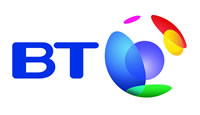 BT have been enjoying government payouts to maintain their networks.
BT have been enjoying government payouts to maintain their networks.
Interesting news for all those that thought it was many years since BT was an ailing monopoly to be propped up by a Labour government.
It was revealed in an answer to a parliamentary question (text below), that around £7 million has been paid to BT in England and Wales, and a contract for work in Scotland, that is not yet complete, should benefit the Telco goliath to the tune of a further £16.5 million. BT has also received undisclosed sums from the East Midlands Development Agency to extend broadband availability in the region.
Now this might come as a surprise to those who’ve got the impression that BT was doing this along with its investment in the so-called 21C network, as some sort of “Noblesse Oblige”.
Looking back over our archives for January of this year, it put a smile on our faces to see BT, when defending itself against smears of improper financial assistance related to the UK property rating system, responded to criticism leveled by those terrible bureaucrats in Brussels with…
“BT is surprised that the European Commission is to investigate the UK government over the property rates that BT has been paying. In BT’s view, any allegation of state aid would be groundless as BT has received no benefit from the UK government. BT is confident that the UK government will demonstrate the fairness of the UK ratings system.”
Expect smaller UK operators to cry foul – with some justification – as they see the dominant player’s position reinforced by government money, and BT’s competitive edge further strengthened in areas that include upgrading their network for TV delivery.
(Ed: Looking at this information, it feels wrong that BT are being given public money to maintain their network, one which they are directly gaining income from. This benefit isn’t passed back to the general public who are funding it, but instead to BT’s shareholders.
—-Fully text of the questions and answer.
Stephen Crabb (Preseli Pembrokeshire, Con)
To ask the Secretary of State for Trade and Industry what the total amount of financial subsidies and grants received by BT has been since 1997 for the purpose of extending broadband availability in the UK.
Alun Michael (Minister of State (State (Industry and the Regions)), Department of Trade and Industry)
Since 1997 BT has received the following financial sums to enable exchanges to extend broadband availability in the UK:East of England Development Agency paid BT approximately £500,000, to enable most of their remaining exchanges in BED A areas. This was awarded through the Broadband Aggregation programme.
Following a competitive tender South West Regional Development Agency awarded BT approximately £3900,000 to enable some exchanges in the Cornwall area.
Following a competitive tender, BT in Wales was awarded £3.6 million of European Structural Funding to upgrade over 40 BT telephone exchanges from UXD5, making ISDB2 services available to 99 per cent. of BT lines. The investment was also used to enable Digital Subscriber Lines, ahead of the commercial roll-out programme for the UK, in BT exchanges in market towns across Wales. It is estimated that the total project value was around £6 million.
Following a full EU Procurement Process to extend broadband availability in the North East region, BT was paid £1,830,345. This sum is subject to a downward adjustment, in accordance with a reverse contribution scheme, which operates to repay money to the Agency if broadband take up in the region exceeds a prescribed level.
£364k was awarded to Vale Royal Local Authority acting on behalf of the Cheshire Digital Development Agency who, following a competitive tender through the North West Regional Aggregation Body, awarded BT a contract to enable of a series of remote rural exchanges in Cheshire.
In Cumbria, Your Communications was awarded a large infrastructure project (Project Access) contract for approximately £17 million following a negotiated, state aid approved OJEU competitive tender. Your Communications sub contracted part of the contract with a value of around £1 million to BT for the early enablement of all the exchanges in Cumbria and specifically for the enablement of 14 exchanges in the remotest areas of the sub region.
In Scotland £16.5 million was awarded to BT following competitive tender. The roll-out has not yet been completed so not all the money has been paid as yet. The European Commission was notified under State Aid rules.East Midlands Development Agency has worked with BT on a number of sub- regional strategic partnerships, to extend broadband availability. As part of the contractual arrangements confidentiality agreements were signed by the sub- regional partnerships to protect information as commercial in confidence. Accordingly, this information is not be available for disclosure.
Hansard reference
 Today will see the share IPO of Eutelsat, the third largest satellite operator.
Today will see the share IPO of Eutelsat, the third largest satellite operator. BT have been enjoying government payouts to maintain their networks.
BT have been enjoying government payouts to maintain their networks. Yesterday evening saw a celebration of The Legacy of Arthur C Clarke at the IEE in London.
Yesterday evening saw a celebration of The Legacy of Arthur C Clarke at the IEE in London.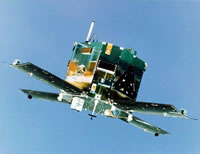 Professor Barry Evans of the University of Surrey considered the 1980’s and 90’s were probably the golden age for communication satellites and predicted their future as an infill technology. Working alongside terrestrial delivery systems, with the possibility of satellite providing TV connectivity to mobile devices outside the fibred home.
Professor Barry Evans of the University of Surrey considered the 1980’s and 90’s were probably the golden age for communication satellites and predicted their future as an infill technology. Working alongside terrestrial delivery systems, with the possibility of satellite providing TV connectivity to mobile devices outside the fibred home. In a sure sign that TV to the mobile is the new European media battleground, 3G mobile operator 3 Italia have announced its plans to purchase the Italian national broadcaster, Canale 7. Reports have put the price of the acquisition at between €30-35m.
In a sure sign that TV to the mobile is the new European media battleground, 3G mobile operator 3 Italia have announced its plans to purchase the Italian national broadcaster, Canale 7. Reports have put the price of the acquisition at between €30-35m.  The company intends to offer a DVB-H mobile TV service from the second half of 2006. Indications are that there will be a minimum of 20 channels, although no line up has yet been decided. 3 Italia already carries Playboy adult entertainment and football via existing technology, and has worked with Mediaset and News Corp’s Sky Italia pay-TV operator.
The company intends to offer a DVB-H mobile TV service from the second half of 2006. Indications are that there will be a minimum of 20 channels, although no line up has yet been decided. 3 Italia already carries Playboy adult entertainment and football via existing technology, and has worked with Mediaset and News Corp’s Sky Italia pay-TV operator. 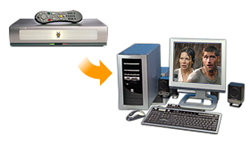 As we
As we  It could be, that time will prove TiVo have announced prematurely this new augmentation, without fully taking account of the wide ranging business and legal implications. But in this fast moving sector, innovation is a necessity rather than an option.
It could be, that time will prove TiVo have announced prematurely this new augmentation, without fully taking account of the wide ranging business and legal implications. But in this fast moving sector, innovation is a necessity rather than an option. TiVo have announced the release of new software, slated for the first quarter of 2006 that will let owners watch recorded television shows on their Sony PSPs and video iPods.
TiVo have announced the release of new software, slated for the first quarter of 2006 that will let owners watch recorded television shows on their Sony PSPs and video iPods. This development is a further blow to TV network schedulers and their much-relied on conventional prime time programmes. This theory is torn apart when mobile viewers are able to watch programmes recorded the previous night, on the go.
This development is a further blow to TV network schedulers and their much-relied on conventional prime time programmes. This theory is torn apart when mobile viewers are able to watch programmes recorded the previous night, on the go.  Nielsen, the top American agency that measures TV viewing audiences, is going to provide ratings that take account of time-shifted viewing through digital recording devices like TiVos even though viewers are able to, and in my experience, generally do, fast-forward through the paid for messages.
Nielsen, the top American agency that measures TV viewing audiences, is going to provide ratings that take account of time-shifted viewing through digital recording devices like TiVos even though viewers are able to, and in my experience, generally do, fast-forward through the paid for messages.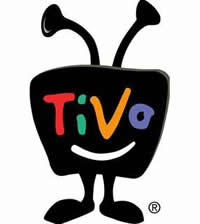 The US networks say that time-shifted ratings should be taken into account, and point out that PVR users watch more TV – which we don’t dispute. They watch around 5.7 hours and that’s more than 10% extra when compared with the technologically-disadvantaged standard household. Their logic follows that this extra 10% of viewing, gives them more opportunity to see commercials. With PVR penetration in the USA already around 8% of the TV universe and expected to rise steadily over the coming years, this adds up to a is significant amount for media buyers.
The US networks say that time-shifted ratings should be taken into account, and point out that PVR users watch more TV – which we don’t dispute. They watch around 5.7 hours and that’s more than 10% extra when compared with the technologically-disadvantaged standard household. Their logic follows that this extra 10% of viewing, gives them more opportunity to see commercials. With PVR penetration in the USA already around 8% of the TV universe and expected to rise steadily over the coming years, this adds up to a is significant amount for media buyers. Convergence took a step forward Friday past as Cisco announced the takeover of Scientific Atlanta (SA). The price? $6.9 billion cash.
Convergence took a step forward Friday past as Cisco announced the takeover of Scientific Atlanta (SA). The price? $6.9 billion cash. The acquisition looks a good fit though, Cisco are keen to push their IPTV proposition, SA’s strength in the US set-top-box market (they have around 40% market share) will allow them to capitalise on the access to the home that video brings. The companies’ combined news release majors on this, John Chambers, president and chief executive officer of Cisco Systems said “Video is emerging as the key strategic application in the service provider triple play bundle of consumer entertainment, communication and online services.”
The acquisition looks a good fit though, Cisco are keen to push their IPTV proposition, SA’s strength in the US set-top-box market (they have around 40% market share) will allow them to capitalise on the access to the home that video brings. The companies’ combined news release majors on this, John Chambers, president and chief executive officer of Cisco Systems said “Video is emerging as the key strategic application in the service provider triple play bundle of consumer entertainment, communication and online services.” Formed in 1951, SA has long been a market leader in Cable TV, has a healthy balance sheet and already has one large IPTV customer in the shape of SBC Communications. The critical mass of SA as part of Cisco should help it win more.
Formed in 1951, SA has long been a market leader in Cable TV, has a healthy balance sheet and already has one large IPTV customer in the shape of SBC Communications. The critical mass of SA as part of Cisco should help it win more.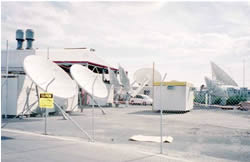 It’s not cheap to launch a satellite and, as commercial satellite operators have become prey to acquisition over the last 2 years, this has been followed by the operators consolidating. The economics of satellite distribution have fundamentally changed in the USA and Western Europe. Expect competition to be fierce in what was until recently a comfortable cartel carved out the International Telecoms Union (ITU) with constituent members many years ago.
It’s not cheap to launch a satellite and, as commercial satellite operators have become prey to acquisition over the last 2 years, this has been followed by the operators consolidating. The economics of satellite distribution have fundamentally changed in the USA and Western Europe. Expect competition to be fierce in what was until recently a comfortable cartel carved out the International Telecoms Union (ITU) with constituent members many years ago. Telecommunications companies like France Telecom are increasingly selling off underused teleport facilities – they’re those places with loads of big satellite dishes pointing towards the heavens. These are being bought by satellite operators so they can offer an integrated end-to-end solution to their customers.
Telecommunications companies like France Telecom are increasingly selling off underused teleport facilities – they’re those places with loads of big satellite dishes pointing towards the heavens. These are being bought by satellite operators so they can offer an integrated end-to-end solution to their customers.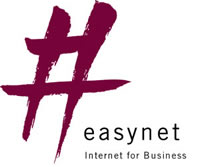 Yesterday, Sky’s takeover of Easynet was finalised and it looks to many that, despite paying a premium on the share price, they’ve have quite a bargain on their hands.
Yesterday, Sky’s takeover of Easynet was finalised and it looks to many that, despite paying a premium on the share price, they’ve have quite a bargain on their hands. Although reports that broadband is the latest media battleground have highlighted the moves by the UK telcos, the ultimate prize is the fabled home digital information gateway. The opportunities that this acquisition enables go beyond a mere triple play option (Inernet, TV & Telephone), allowing Sky to, begin by become the overriding aggregator of TV content and, in time, become the preferred digital gatekeeper for many UK homes.
Although reports that broadband is the latest media battleground have highlighted the moves by the UK telcos, the ultimate prize is the fabled home digital information gateway. The opportunities that this acquisition enables go beyond a mere triple play option (Inernet, TV & Telephone), allowing Sky to, begin by become the overriding aggregator of TV content and, in time, become the preferred digital gatekeeper for many UK homes.